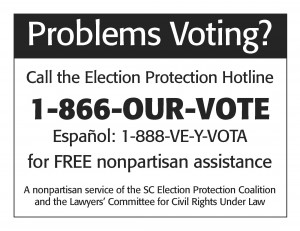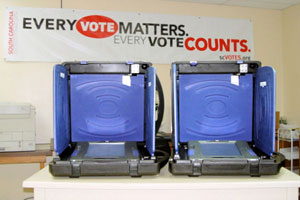By Becci Robbins
SC Progressive Network Communications Director
A SC Legislative Audit Council report released March 27 on the state’s voting machines found serious glitches. “Problems with iVotronic machines that have been reported in elections in other states include vote flipping, candidates missing from screens, lost votes or too many votes, freezing, and batteries,” the report found.
The report didn’t mention that many of those states have quit using the iVotronics, which are no longer being manufactured. While these same problems have been widely observed in South Carolina, every precinct still uses them.”63% of the counties that had problems with the machines have not reported the problems to the State Election Commission (SEC),” the study reported, and recommended the SEC establish a hotline to track problems with the machines.
The SC Progressive Network has helped run a statewide election day hotline, 866-OUR-VOTE, in every general election since 2004. Network Director Brett Bursey said, “In the last general election, while all the news was focused on long lines in Richland County, we had calls from five other counties about machine problems causing hours-long waits to vote.”
 “The SEC has not gathered information about the increasing unreliability of these machines, which are reaching the end of their projected 10-year-lifespan,” Bursey said, “and we welcome the LAC report as the start of a serious discussion about what our new voting system should look like.”The Network opposed the purchase of the iVotronic machines in 2004, in part, due to their inability to produce a voter-verified paper ballot that could be used to call a close race. The LAC report concluded, “The audit process in South Carolina is limited by the absence of a voter-verified paper audit trail (VVPAT).” The LAC determined that a VVPAT could be added to the existing machines for $17.3 million.
“The SEC has not gathered information about the increasing unreliability of these machines, which are reaching the end of their projected 10-year-lifespan,” Bursey said, “and we welcome the LAC report as the start of a serious discussion about what our new voting system should look like.”The Network opposed the purchase of the iVotronic machines in 2004, in part, due to their inability to produce a voter-verified paper ballot that could be used to call a close race. The LAC report concluded, “The audit process in South Carolina is limited by the absence of a voter-verified paper audit trail (VVPAT).” The LAC determined that a VVPAT could be added to the existing machines for $17.3 million.
The 2013 House budget includes $5 million that the SEC has requested to begin saving for a new system after 2016.
“Rather than consider patching up these machines, or buying more used ones as Richland County is planning, we need to be looking at better and cheaper ways to vote — well before 2016,” Bursey said.
The Network has long advocated a voter-verifiable voting system like the one Clemson has devised.
Dr. Juan Gilbert, Chair of the Clemson School of Computing, Human-Centered Computing Division, has been doing research and development on electronic voting systems since 2003. He got a $4 million grant from the federal Election Assistance Commission (EAC) several years ago to develop a better voting system. The EAC sets standards for voting machines, and has never approved the system currently used in South Carolina.
Gilbert’s “Prime III” meets federal requirements, and was used in a state election for the first time in January in Oregon. Prime III runs on open-source software, on machines available at any computer store. It’s simple, cheap, reliable, produces a voter-verified-paper ballot, and can be publicly owned. The privately owned system we now use costs $1million in annual licensing fees, more on tech support, and runs on secret codes.
“We see no legal impediments to using a system like Clemson has developed, and tremendous advantages,” Bursey said. “Clemson can provide the software, our technical schools can train technicians, and a whole new statewide system would cost little more than adding a paper trail to our old machines.”

